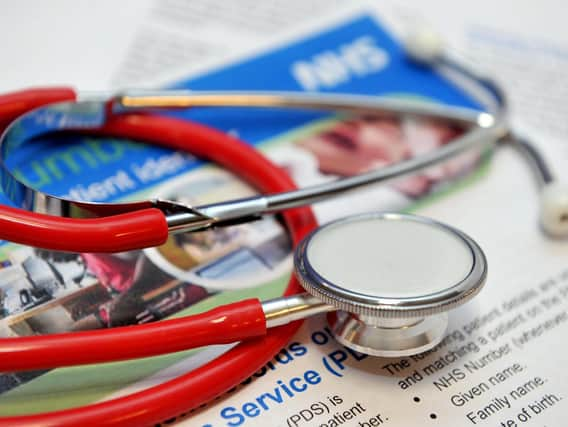'Dr Google' has become our first port of call as we wait for GPs - Jayne Dowle


WHEN did you last see your GP? For me, about four years ago, but then I’m fortunate to be in general good health. Any niggles can be self-cured, I’ve found.
Isn’t that what we’re all doing these days, as far as possible? ‘Dr Google’, once derided by health professionals as unreliable, even dangerous, has become our first port of call as waiting lists for GP appointments stretch into fortnights, even months. Either that or accept privatisation via the back door.
Advertisement
Hide AdAdvertisement
Hide AdMy teenage son, Jack, has Osgood Schlatter’s disease in his knee which has recently flared up again thanks to long hours standing at work and football training. Phoning our family doctor, or going online to book an appointment, didn’t even cross my mind.
A decade ago, when Jack’s problem first arose, we saw a kindly young doctor who referred him for NHS physio treatment. I know there isn’t a chance of this now and would feel guilty for even asking. I’ve got him a slot with a private physiotherapist instead, at a likely cost of £75.
We taxpayers are feeling the NHS crisis in our pockets, so it’s quite galling to hear that the average salaried GP now earns £100,700 before tax, according to official NHS figures for the year 2019-20 (though GP partner expenses have been rising faster than their income, though, NHS Digital said). This is up from £98,000 the year before.
That’s three times more than nurses, who get £33,384 on average and have had to fight the Government for their promised pay rise. And we can’t even get unfettered access? How does that add up?
Advertisement
Hide AdAdvertisement
Hide AdThe pay increase, part of a ground-breaking £2.8bn five-year contract deal announced in 2019, has been hailed as “the biggest boost to primary care in 15 years” and is part of a much-needed and thrashed-out package to improve GP services.
No one would disagree that a good GP is actually worth their weight in gold. However, whilst we all appreciate that GP practices, like the rest of the NHS, have been under unprecedented
pressure during the pandemic, I’m concerned at the alarming slide into self-diagnosis.
We’ve had it drilled into us by the Government that we must seek an in-person doctor’s appointment only when absolutely necessary. This message is heartily reinforced by doctors’ receptionists, or at least the hard-core chapter who could be usefully redeployed to MI5 interrogation services.
Advertisement
Hide AdAdvertisement
Hide AdIt is clear. We must accept technology has a role to play in modern doctors’ surgeries, where touch-screen booking portals have replaced the tattered copies of Reader’s Digest magazines.
There is no arguing with that. It’s necessary, especially as the number of patients seeking GP care continues to spiral ever upwards.
However, many of us suspect that the pressures of the pandemic have hastened the roll-out. Pragmatic yes, but not always practical.
My parents grew up believing that the NHS would be there for them from cradle to grave. In recent years, they have become increasingly puzzled, frustrated and disappointed that it is not, especially when it comes to family doctors.
Advertisement
Hide AdAdvertisement
Hide AdWhen dad had a minor fall not long ago, he managed to secure a telephone appointment with his GP, who told him to take a photograph of the injury and email it over.
He was taken aback, but it’s a common request now. Before the pandemic, 79 per cent of GP appointments were face-to-face, but this fell to 30 per cent at the peak of the Covid-19 crisis. Latest figures show that they are at 56 per cent.
Dennis Reed, the director of Silver Voices, a campaign group for the over-sixties, puts his finger straight on the button: “Just because younger people are comfortable with technology, we can’t assume everyone is.”
Mr Reed argues that many older people feel that the pandemic has been used as cover to make changes to the way the health service operates in a way that discriminates against them.
Advertisement
Hide AdAdvertisement
Hide AdMany have been left “frightened” and locked out of the system, he says, because of their struggles to navigate technology: “We are worried that a lot of serious conditions are going undiagnosed, because so many people feel discouraged from seeing their GP, and don’t feel comfortable or able to have remote consultations.”
No wonder people are wary and worried. When does “well, I didn’t want to trouble my GP…” become the missed opportunity to spot a serious medical issue, such as cancer? Frighteningly often, it would seem.
Highly-respected medical journal The Lancet, no less, fears that delays in diagnosis and referral will indisputably lead to excess early cancer mortality.
We can count GP salaries in hundreds of thousands of pounds, but how do we count the loss of cherished family members and dear friends?
That’s the question we really should be asking.
Advertisement
Hide AdAdvertisement
Hide AdSupport The Yorkshire Post and become a subscriber today. Your subscription will help us to continue to bring quality news to the people of Yorkshire. In return, you'll see fewer ads on site, get free access to our app and receive exclusive members-only offers. Click here to subscribe.